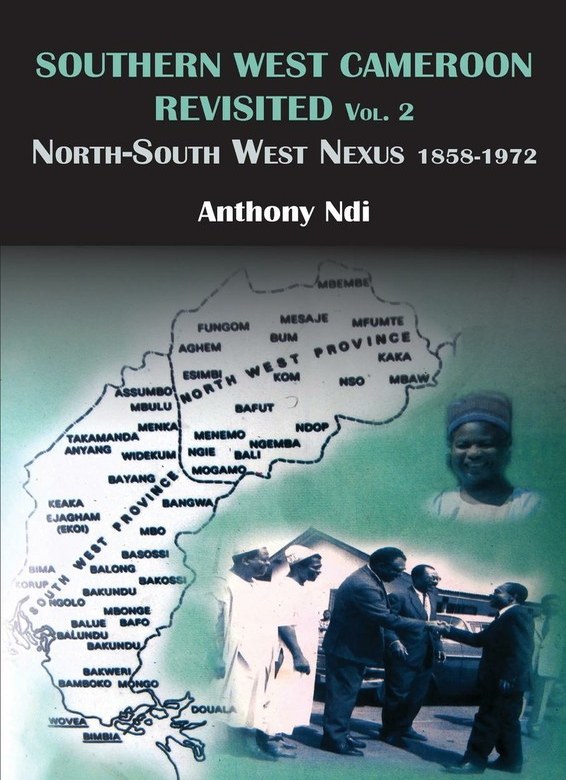written by Anthony Ndi
North-South West Nexus 1858-1972
This book argues that Southern Cameroons up to the late 1960s had extensively developed an evolved mature, political culture. It was amazingly led by a range of: simple, visionary, austere, honest, peace-loving and realistic leaders, almost without exception; vintage products of their epoch. Distinguished by good governance; throughout it organized frequent free, fair and transparent elections, peaceful handover of power and enjoyed free primary and adult education. It was further crowned with an ideal, efficient civil service, literally, corruption free. In fact, the period, 1955-1968 in the history of Southern Cameroons qualifies as a “Golden Age” for that nostalgic state, whose citizens were repeatedly referred to as “nice, peace loving, loyal, good and hospitable people” by administrators, missionaries, visitors and those who got to know them closely. The most remarkable observation however, was that finally made by Malcolm Milne, the greatest critic, who noted that during his last couple of years in the Southern Cameroons administration, he dealt with: “People of high intelligence who knew exactly what they wanted.” Of the civil servants, he maintains that they had greatly enriched his time in the colonial service; “There was something very special about that corps; their service was their watch word.” This superlative description by Malcolm Milne was being made of a combination of the people of the present North and South West Regions, whom he saw as a socio-cultural, economic and political unit. It is therefore obvious that from 1955 – 1968, Southern West Cameroon came close towards becoming an ideal state.
| ISBN | 9789956791323 |
| Pages | 276 |
| Dimensions | 229 x 152mm |
| Illustrations | B/W Illustrations and Maps |
| Published | 2014 |
| Publisher | Langaa RPCIG, Cameroon |
| Format | Paperback |





4 comments
“In his new work, Anthony Ndi bombards us with exciting new revelations about the events leading up to the reunification of Cameroon and beyond. What counts for many still today as a tragic historical memory, is given substance and cause in his careful analysis of the sources available, now reinforced by new materials released since 2012 from the archives of the UK Foreign Commonwealth Office. Ndi’s focus on the personalities of the major players leading to the breaking of the promise made by the British to support independence for Southern Cameroons and the subsequent plebiscite decision to re-join La République du Cameroun, enriches our understanding of the mixture of shrewd tactics by and naive blunders of the many that actually shaped events. As a case study in the realities of how decisions were made and later regretted in a period of quite shameful indiscretion, we are given a salutary account of how a history that hitherto had been written from the standpoint of the victor, needed to be and here is rewritten from that of the vanquished.”
Michael Rowlands, Emeritus Professor of Anthropology and Material Culture, University College London
“A monumental treatise with startling revelation on Cameroons’ national history, written with superb confidence….”
Professor Tafah Edokat Oki Edward, Vice Chancellor, University of Bamenda
“… written by a luminous historiographer [….] the historical plot espoused by the author resides in a setting of controversies where the tension between the force of argument and the argument of force seem to be conspicuously evident and where rhetoric and reality stand astride”
Mathew Basung Gwanfogbe, PhD, Associate Professor of History, University of Bamenda.
“Anthony Ndi argues forcefully and convincingly that Ahidjo’s ‘bad faith’ and determination to introduce a centralized personal authoritarian rule largely explains the failure of the Federal Republic of Cameroon… without a fair trial period”
Professor Tazoacha Asonganyi, The University of Yaounde I